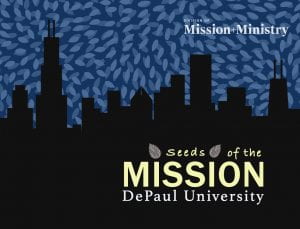As the DePaul community actively considers what is fundamental to how we understand and live our shared Vincentian mission, what initiatives, stories, and people serve as authentic and striking examples of our mission to you?
 The examples that come to mind as you reflect on this question might be understood as Seeds of the Mission, the title of the current Division of Mission and Ministry campaign. This campaign is an important first step in the process that will be taking place in the coming months as part of the review and potential revision of the DePaul University mission statement.
The examples that come to mind as you reflect on this question might be understood as Seeds of the Mission, the title of the current Division of Mission and Ministry campaign. This campaign is an important first step in the process that will be taking place in the coming months as part of the review and potential revision of the DePaul University mission statement.
The concept of a seed suggests something that is small now, but that also has great potential for growth if tended and cared for. Seeds are a hopeful sign. Therefore, this image speaks to the importance of what we are doing now to sustain the future of our shared Vincentian mission for the generations who follow. The future vitality of our Vincentian mission will depend on our ability to identify and cultivate what is essential to our mission today, especially within the context of DePaul’s vocation as a university.
The foundational concept behind the Seeds of the Mission campaign borrows and adapts the idea of “seeds of the Word.” This phrase appears most notably in Vatican II documents and describes the relationship between the mission of the Catholic Church and peoples of various cultures and religions around the world. The concept is traced back to a famous second-century Christian philosopher and martyr named Justin, who introduced the idea of “seeds of the Word of God.”1 The Vatican II documents use this concept to encourage people of faith to “…gladly and reverently lay bare the seeds of the Word which lie hidden among their fellows.”2 According to this understanding, the seeds of the Word are present in the heart of every person, and in any human initiative, that strives toward the justice, mercy, and compassion as modeled by the life of Jesus. The underlying theology inherent in this concept promotes an approach to diverse peoples founded on human dignity, engagement, and dialogue. It emphasizes an understanding of the Church’s activity in the world that corresponds closely to the vision and praxis of the current Pope Francis, as well as to our own Vincentian charism.
At DePaul, we often speak of bringing together “a community gathered together for the sake of a common mission.” We believe this communal approach enables our students to gain personal wisdom while we work together to build a more just society that honors and affirms the dignity of all.
Considering this background rooted in the Vincentian practice of valuing and learning from experience, the Seeds of the Mission campaign invites you, the DePaul community, to share what you have seen. What you have experienced that resonates with or reflects the heart of DePaul’s mission?
Please let us know: What initiatives, stories, and people serve as authentic and striking examples of DePaul’s Vincentian mission for you?
- Submit your input to the: Seeds of Mission campaign
- For a full description of the Seeds of Mission Campaign: Click here
1) First Apology of Justin Martyr, Apol. I. 44.
2) 11, Ad Gentes, Decree on the Mission Activity of the Church, Second Vatican Council, 7 December 1965.